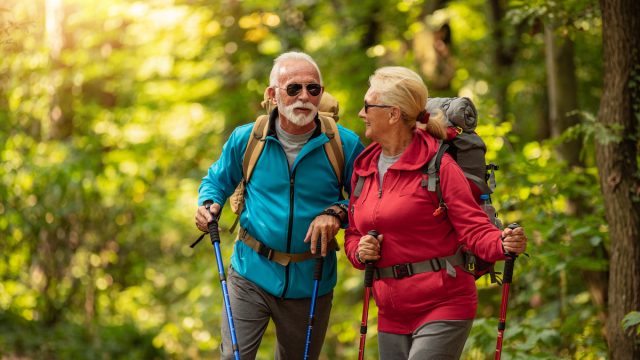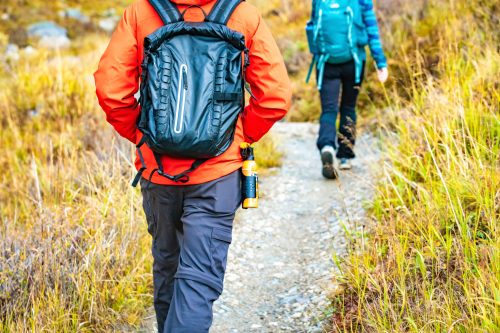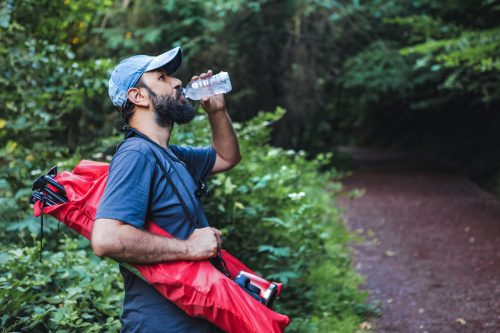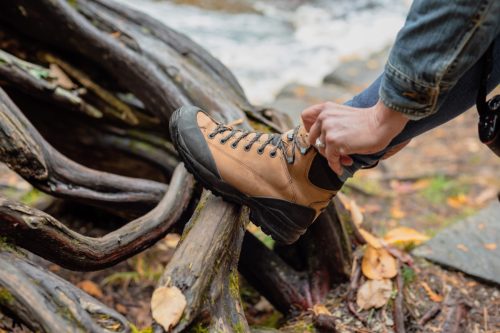If You’re Over 50, Never Bring This on a Hike, Experts Say

Hiking is a healthy and fun activity to participate in at any age. Whether you prefer taking things slow on a leisurely ramble or want to test your endurance on a more vigorous journey, hitting the trails can improve physical strength, balance, blood pressure, cardiovascular health, and mood. However, as you age there are a few modifications you’ll want to make to your outdoor adventures—and an easy place to start is what you bring with you. Read on to discover what you should never bring on a hike if you’re over 50.
RELATED: Walking Exactly This Much a Week Adds Years to Your Life, Study Says.
After 50, don’t bring alcohol on a hike.

Indulging in a beer or a shot of whiskey during your hike might seem fun, but outdoor experts warn it’s not worth the risk.” Alcohol can severely impair judgment and coordination, leading to dangerous situations,” says Kevin Wabiszewski, former marines infantry squad leader and founder of Marine Approved. This is especially important after 50 when you experience the changes in balance, strength, and flexibility that naturally come with age.
Hitting the bottle can also cause dehydration, sleep problems (which are especially unwelcome if you’re staying overnight), and unexpected hangovers, as higher altitudes can thin your blood, notes Mark Joy, outdoors expert and founder of the outdoors website Mark Joy Blogs. “Avoid alcohol to keep yourself in peak performance mode during your hike,” says Joy. “There is already enough to worry about when you’re out in the wilderness.”
Instead of alcohol, Wabiszewski urges hikers to stock up on water. “Dehydration can occur quickly in warm weather, so it is important to drink plenty of water before and during a hike,” he says. “Water helps keep the body cool and hydrated.” It may not be as fun in the moment, but it’ll keep your body happy and healthy.
Avoid an ill-fitting backpack.

Alcohol isn’t the only thing you should consider leaving at home if you’re over 50: You can add an ill-fitting backpack to your list, too. “As we age, we’re already more inclined to have back pain, so you don’t want to add to that with a backpack,” says Erin Gifford, outdoors expert and founder of Go Hike Virginia. “Choose a daypack with waist and chest straps to adjust the load and distribute weight so it’s not centered on your back and shoulders.”
To ensure it fits your body properly, visit your local hiking, backpacking, or sporting-goods store and speak with an expert. They’ll be able to help you choose one that’ll keep you comfortable during your hike and last for years.
RELATED: For more travel advice delivered straight to your inbox, sign up for our daily newsletter.
Don’t bring a chair.

As you get older, a place to sit is sometimes priceless (and no, you’re not bending into the criss-cross applesauce position anymore). However, the urge to take a seat shouldn’t tempt you to bring a backpacking chair, says Alison Watta, creator and editor of travel and outdoor site Exploration Solo. “If you think you may need to stop and sit and are worried about getting up from the ground, there are other options,” she explains. Most importantly, those options don’t require adding bulkiness and weight to your load, which can easily lead to an injury and decrease your level of enjoyment on your hike.
Watta recommends a sit pad—a portable foam mat—which can be placed on a log or other lifted item to keep you dry, bug-free, and comfortable. “Also, many parks have benches and other places to rest,” she adds. “If you choose your location carefully, you can avoid having to carry a heavy chair.”
Always come prepared.

Just because hiking is fun and rewarding doesn’t mean it can’t be dangerous. “The number one thing a hiker over 50 should never bring on a hike is a lack of experience and preparation,” says Ganga Raj Thapa, CEO of bespoke adventure company Nepal Hiking Team. If you’re new to hiking, head out with a more experienced buddy or join a group hike on a site like Meetup. You’ll also want to research each trail—including its weather and conditions—before you leave to ensure it’s something you can handle and that you’ve packed correctly.
Raj Thapa cautions hikers—especially those over 50—to do their research before their trip and bring all of the appropriate gear for the conditions they’ll be facing. “Additionally, take into account your own physical abilities and limitations when planning your hike,” he says. By doing so, you’ll ensure you have a safe and enjoyable journey.
RELATED: The Most Walkable U.S. Cities in America for Seniors.